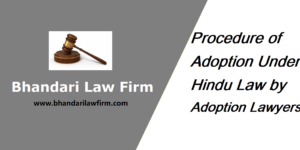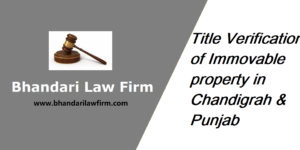Senior Citizen and Their Child Eviction Proceedings
“Eviction is one part of the right to protect the property of a senior citizen, which could be exercised by a senior citizen in terms of provisions of the statute, rules framed and the action plan notified,” the High Court bench said”

The High Court for the States of Punjab and Haryana was hearing a petition filed by a Mohali man, who had contested the deputy commissioner’s order on his eviction from his parents’ house. His mother, a senior citizen, is the owner of the house. After her husband died, she had allowed the man, his wife and children to live in the house. However, they started harassing her, the woman’s lawyer said.
Her son claimed that the property was disputed, and they also had a right to it, since it was built by his father. The son had lost a civil suit before in a Mohali court, which prompted the deputy commissioner to order his eviction within 30 days. However, he contested the order in the high court, stating that under the Maintenance and Welfare of Parents and Senior Citizens Act, 2007, an eviction order cannot be passed.
the Hon’ble High Court bench said:
“Once a senior citizen makes a complaint to the district magistrate against the children for vacation of the premises, such summary procedure will ensure benefit of the parents. The children will have no right to resist the eviction only on the grounds that the law does not contemplate eviction of an occupant,”
“Eviction is one part of the right to protect the property of a senior citizen, which could be exercised by a senior citizen in terms of provisions of the statute, rules framed and the action plan notified,”
Click Here to Download Maintenance and Welfare of Parents and Senior Citizens Act, 2007
There cannot be any effective protection of property of the senior citizens unless the district magistrate has the power to put the property in their possession and/or to restrain or eject the person who wishes to interfere in the possession of the property of the senior citizen, the HC said, adding that the children can remain occupants till he or she enjoys the goodwill of a parent.
Steady rise in complaints by senior citizens
As per the 2017 National Crime Records Bureau (NCRB), Chandigarh, tops the country in the list of crimes against the elderly. A total of 145 complaints were filed under the Maintenance and Welfare of Parents and Senior Citizens Act, 2007, between April 1, 2016 and March 31, 2017. Of the 105 cases decided, 69 were in the favour of parents, while a compromise was reached in 22. The number of complaints in 2016 were 48, against 26 in 2015.
In Panchkula, the deputy commissioner was hearing as many as 30 cases as of May 2017, while SAS Nagar saw 41 such complaints from April 1, 2016 to March 31, 2017. In 2018 it has been increased. Its good for us that senior citizen are now aware about their right.
The most of the complaints are being filed in only in Chandigarh, behind this it court be reason that the parent in Chandigarh are well educated and well aware about their rights in India. That’s why through out India in Chandigarh highest complaint have been filed under this Act.
The illiterate person do not know about his/her rights, so he/she will never approach under this Act, Indian Government should have arrange camps in rural area and should aware about these laws. Then only purpose of this Act can be achieved.
Parents, know your rights
■ The Maintenance and Welfare of Parents and Senior Citizens Act, 2007, provides legal provisions for the maintenance and welfare of parents, who are unable to maintain themselves. Not only this the parents may also get cancellation of transfer deed, gift deed or any instrument by which they have given their property to their son, daughter or relative.
■ The act provides simple, speedy and inexpensive mechanism for the protection of life and property of the elderly. The proceedings under this Act are summery in nature and all complaint are being taken in Action Plan.
■ Parent means father or mother whether biological, adoptive or step father or step mother, whether or not he or she is a senior citizen.
■ Maintenance means “provision for food, clothing, residence and medical attendance and treatment”.
■ A senior citizen can submit an application for maintenance and welfare to the local maintenance tribunal presided by the local sub-divisional magistrate, who can order the children to provide monthly allowances up to Rs 10,000.
■ Section 24 of the Act provided for imprisonment for up to three months and/or fine of up to Rs 5,000 if a person abandons a senior citizen he or she is responsible for.
For more information the senior citizen may contact us any time for seeking free legal advice from any corner of India by dialing +919855677966



